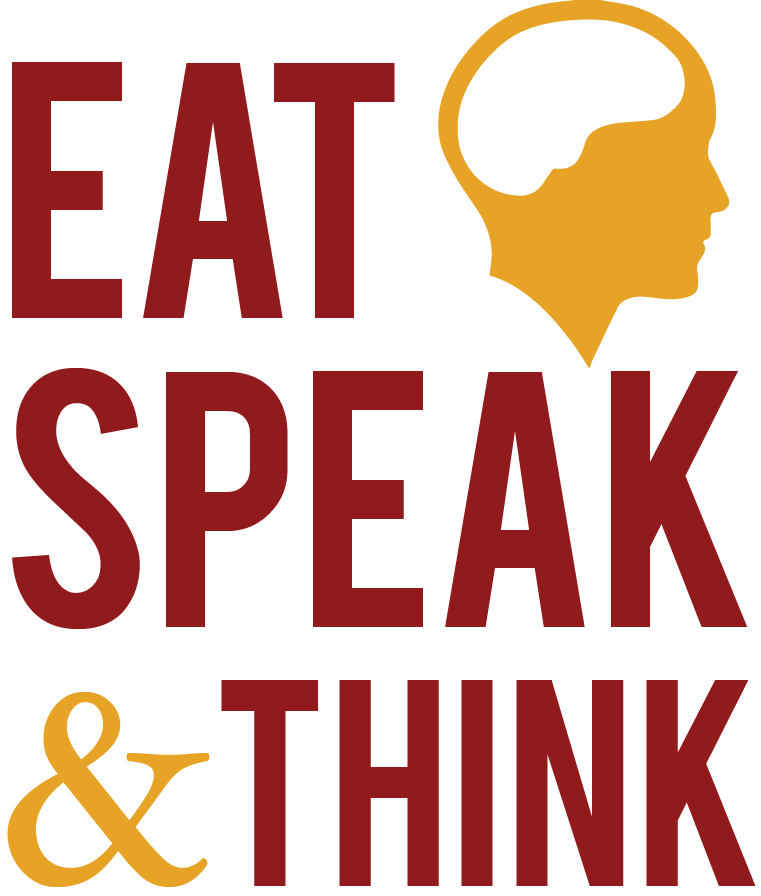“I don’t need a speech therapist, I talk fine”
I can’t tell you how many times I’ve heard this in the past ten years, but it’s a lot! I don’t mind hearing this comment, since until I met a speech-language pathologist (SLP) as an adult, I thought all they did was fix lisps and helped with stuttering. Luckily for me, I found out how wrong I was! Now I welcome the chance to educate others about what we do.
SLPs work to prevent, diagnose, and treat swallowing problems, communication problems, and cognitive (specifically, cognitive-communication) problems in people of all ages. Since I’m currently working with adults, that’s what I’ll focus on.
Swallowing
Swallowing problems are a common consequence of certain conditions such as stroke, dementia, Parkinson’s disease, ALS (amyotrophic lateral sclerosis or Lou Gehrig’s disease), and head & neck cancer. Swallowing problems can also be caused by weakness, delirium, and medication.
Impaired swallowing can lead to dehydration, malnutrition, or aspiration (food or liquids going into the lungs). Aspiration can lead to aspiration pneumonia under certain conditions. Impaired swallowing can also lead to loss of pleasure in eating and socializing.
The goal of swallowing therapy is to promote safe and efficient eating and drinking, while respecting personal preferences. Treatment may involve changes to where and how a person eats, the type of foods or drinks, and/or exercises to improve function.
Communication
Communication problems involve the voice (how the speech sounds), speech (the way someone says words) and language (how words are chosen or understood).
Communication impairments are common in certain conditions such as stroke, dementia, Parkinson’s disease, ALS, and in professions that require a heavy use of the voice.
The goal of communication therapy is to improve a person’s ability to communicate effectively and may involve exercises to improve communication abilities, strategies to compensate for difficulties, and the use of communication devices.
Cognition
SLPs work with a subset of cognitive skills, which we call cognitive-communication. SLPs may diagnose and treat cognitive-communication problems, involving attention, memory, reasoning, problem solving, and executive function skills.
Cognitive-communication difficulties may be associated with conditions such as stroke, a head injury, Mild Cognitive Impairment, dementia, and Parkinson disease.
People with a cognitive-communication impairment may have trouble with daily activities such as remembering conversations and other information, keeping track of the date and their appointments, learning new information and procedures, paying bills correctly and on time, and difficulty setting and achieving goals.
Therapy may focus on improving these skills directly, teaching strategies to compensate for difficulties, and/or making changes to the environment to make things easier. We also provide information about resources and support.
Education and Training
CCC-SLP stands for Certification of Clinical Competence in Speech-Language Pathology and is awarded by ASHA (the American Speech-Language-Hearing Association).
Becoming an SLP is a long process involving three key steps: earning a master’s degree, passing a Praxis national exam, and completing a clinical fellowship (CF). SLPs then must meet ongoing requirements to maintain a state license and the national certification which allows them to place “CCC-SLP” after their name and degree.
To earn a master’s degree, an SLP must complete an accredited speech-language pathology program with a minimum of 36 semester hours at the graduate level and a minimum of 375 hours of supervised direct patient contact. Programs have additional requirements.
After passing the national Praxis exam in speech-language pathology, the SLP works under the direct supervision of a more experienced clinician for a period of time, generally 9-12 months, until they’ve met the requirements for completing their clinical fellowship (CF). During this period, the SLP places “CCC-CF” after their name and degree.
Once the SLP has earned “CCC-SLP”, they have to follow a code of ethics and complete 30 hours of continuing education every 3 years. The SLP must meet other requirements to maintain their state license.
It takes a lot of time and energy to become an SLP and to maintain our skills, but in my opinion, it is well worth the effort!
Lisa earned her M.A. in Speech-Language Pathology from the University of Maryland, College Park and her M.A. in Linguistics from the University of California, San Diego.
She participated in research studies with the National Institute on Deafness and other Communication Disorders (NIDCD) and the University of Maryland in the areas of aphasia, Parkinson’s Disease, epilepsy, and fluency disorders.
Lisa has been working as a medical speech-language pathologist since 2008. She has a strong passion for evidence-based assessment and therapy, having earned five ASHA Awards for Professional Participation in Continuing Education.
She launched EatSpeakThink.com in June 2018 to help other clinicians be more successful working in home health, as well as to provide strategies and resources to people living with problems eating, speaking, or thinking.


Be First to Comment